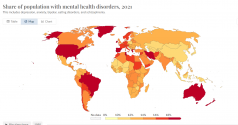You say that Japan and South Korea's metrics are objective proof of their success. I say that their metrics are don't show anything of the sort, because their people are miserable, their demographics are a disaster, and their "wealth" is temporary, conditional, and illusionary.
False, their people are not any more miserable than people in other developed countries according to various happiness and satisfaction-related polls. This is just Euro-Westoid racist propaganda. Their demographics are weak in one aspect, but strong in another as they have one of the most intelligent and educated populations on the planet.
Their wealth is based on the real economy, high-tech manufacturing, and exports, unlike Western money printing, and services, machines that could pop out at any time, a model possible and surviving only on old, colonial glory - but probably not for much longer.
Edit: Just do one Google search man, it's not hard, don't eat all that Westoid propaganda, at face value, see truly how "miserable" who is lmao:

What I will address, however, is one specific fact that both you and Index consistently ignore - which is that POPULATION STRUCTURE is far more important than POPULATION SIZE.
Having a highly educated population is useless if 70% of them are over 65 years old. It is a biological fact that cognition peaks before the age of 55 (most in the 20s and 30s) and experiences a rapid decline into the 60s and 70s. 100% of your population could have tertiary education, but if 70% of them are retired, 15% of them are children, and the remaining 15% are busy just trying to keep society running, you're going to have a hard time.
Who cares if 70% are old if they created enough value through their productive years to support themselves into retirement age?
Or if the remaining working population is 20 times more productive than Indians for example, and pays explicit and implicit 'taxes' (unlike them), to support their elders (unlike them again)?
That's a good point, but the technology is converging not just in the computer science/AI field but in medicine and life sciences too.
Some world-leading anti-aging experts (not pseudo-scientists) even legitimately think that for example, they could live above 100 or even forever.
You see this everywhere, not only in average lifespans but also in many athletes being active for longer than ever, people working, etc.
And the usual answer to this - "AI / robots will save us" - is just another admission that there is no solution beyond some miracle technology.
Automation is already "saving" Japan for example right now. They have kept their old wages pretty much for decades already despite the inverted population pyramid. Also, when we are talking about technology, there are other technologies that could mitigate this - biotech.

